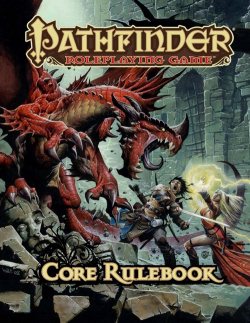User:Wizardoest/Read/Pathfinder Core Rulebook: Difference between revisions
From Drinking and Dragons
Wizardoest (talk | contribs) mNo edit summary |
Wizardoest (talk | contribs) Starting my PF core book reading. |
||
| Line 1: | Line 1: | ||
[[File:Pathfinder Core Rulebook.jpg|right| | [[File:Pathfinder Core Rulebook.jpg|right|250px]] | ||
When D&D 4e came out, Paizo took advantage of this gap (and the OGL) to produce what most gamers consider to be D&D 3.75. Now that I've been playing it for nearly two months, I thought that I would read it and post my thoughts. | When D&D 4e came out, Paizo took advantage of this gap (and the OGL) to produce what most gamers consider to be D&D 3.75. Now that I've been playing it for nearly two months, I thought that I would read it and post my thoughts. | ||
| Line 7: | Line 7: | ||
;Strength | ;Strength | ||
: | : {{PF}} A character with a Strength score of 0 is too weak to move in any way and is unconscious. | ||
: {{d20}} A character with Strength 0 falls to the ground and is helpless. | : {{d20}} A character with Strength 0 falls to the ground and is ''helpless''. | ||
Why would someone with Str 0 fall unconscious? Especially since a Dex 0 creature is still conscious. | |||
;Dexterity | |||
: {{PF}} A character with a Dexterity score of 0 is incapable of moving and is effectively immobile (but not unconscious). | |||
: {{d20}} A character with Dexterity 0 is ''paralyzed''. | |||
Why not just define it as ''helpless''? Applying ''paralyzed'' may allow it to be fixed by spells that remove the paralyzed condition? | |||
;Constitution | |||
: {{PF}}: A character with a Constitution score of 0 is dead. | |||
: {{d20}}: A character with Constitution 0 is dead. | |||
;Intelligence | |||
: {{PF}}: A character with an Intelligence score of 0 is comatose. | |||
: {{d20}}: A character with Intelligence, Wisdom, or Charisma 0 is unconscious. | |||
;Wisdom | |||
: {{PF}}: A character with a Wisdom score of 0 is incapable of rational thought and is unconscious. | |||
: {{d20}}: A character with Intelligence, Wisdom, or Charisma 0 is unconscious. | |||
;Charisma | |||
: {{PF}}: A character with a Charisma score of 0 is not able to exert himself in any way and is unconscious. | |||
: {{d20}}: A character with Intelligence, Wisdom, or Charisma 0 is unconscious. | |||
I prefer how in 3.5 that zeroed abilities applied defined conditions. This reduces ambiguity. | |||
Revision as of 04:16, 19 August 2011

When D&D 4e came out, Paizo took advantage of this gap (and the OGL) to produce what most gamers consider to be D&D 3.75. Now that I've been playing it for nearly two months, I thought that I would read it and post my thoughts.
Abilities
The effects of having a zero score is listed with the ability description. In d20 3.5 it was listed in the glossary.
- Strength
 A character with a Strength score of 0 is too weak to move in any way and is unconscious.
A character with a Strength score of 0 is too weak to move in any way and is unconscious. A character with Strength 0 falls to the ground and is helpless.
A character with Strength 0 falls to the ground and is helpless.
Why would someone with Str 0 fall unconscious? Especially since a Dex 0 creature is still conscious.
- Dexterity
 A character with a Dexterity score of 0 is incapable of moving and is effectively immobile (but not unconscious).
A character with a Dexterity score of 0 is incapable of moving and is effectively immobile (but not unconscious). A character with Dexterity 0 is paralyzed.
A character with Dexterity 0 is paralyzed.
Why not just define it as helpless? Applying paralyzed may allow it to be fixed by spells that remove the paralyzed condition?
- Constitution
 : A character with a Constitution score of 0 is dead.
: A character with a Constitution score of 0 is dead. : A character with Constitution 0 is dead.
: A character with Constitution 0 is dead.
- Intelligence
 : A character with an Intelligence score of 0 is comatose.
: A character with an Intelligence score of 0 is comatose. : A character with Intelligence, Wisdom, or Charisma 0 is unconscious.
: A character with Intelligence, Wisdom, or Charisma 0 is unconscious.
- Wisdom
 : A character with a Wisdom score of 0 is incapable of rational thought and is unconscious.
: A character with a Wisdom score of 0 is incapable of rational thought and is unconscious. : A character with Intelligence, Wisdom, or Charisma 0 is unconscious.
: A character with Intelligence, Wisdom, or Charisma 0 is unconscious.
- Charisma
 : A character with a Charisma score of 0 is not able to exert himself in any way and is unconscious.
: A character with a Charisma score of 0 is not able to exert himself in any way and is unconscious. : A character with Intelligence, Wisdom, or Charisma 0 is unconscious.
: A character with Intelligence, Wisdom, or Charisma 0 is unconscious.
I prefer how in 3.5 that zeroed abilities applied defined conditions. This reduces ambiguity.